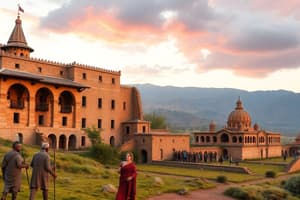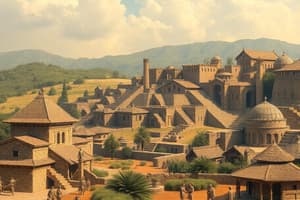Podcast
Questions and Answers
Which political system involves a ruler who inherits power?
Which political system involves a ruler who inherits power?
- Monarchy (correct)
- Democracy
- Authoritarian regime
- Socialism
Which economic system is characterized by the absence of government involvement?
Which economic system is characterized by the absence of government involvement?
- Barter system
- Capitalism (correct)
- Socialism
- Mixed economy
Which figure is primarily known for his influence on non-violent resistance?
Which figure is primarily known for his influence on non-violent resistance?
- Nelson Mandela
- Mahatma Gandhi (correct)
- Genghis Khan
- Socrates
What theme in world history focuses on the interactions between nations?
What theme in world history focuses on the interactions between nations?
Which philosopher is credited with laying the foundations of Western philosophical thought?
Which philosopher is credited with laying the foundations of Western philosophical thought?
Which religion is primarily associated with the belief in Karma and Dharma?
Which religion is primarily associated with the belief in Karma and Dharma?
Which of the following inventions was NOT made during the Ancient Civilizations era?
Which of the following inventions was NOT made during the Ancient Civilizations era?
What significant societal structure characterized the Middle Ages in Europe?
What significant societal structure characterized the Middle Ages in Europe?
Which major philosophical development originated during Classical Antiquity?
Which major philosophical development originated during Classical Antiquity?
Which event marked a significant demographic consequence in Europe during the Middle Ages?
Which event marked a significant demographic consequence in Europe during the Middle Ages?
During which era did the exploration of the Americas primarily take place?
During which era did the exploration of the Americas primarily take place?
What concept refers to the movement of ideas, customs, and technologies across cultures?
What concept refers to the movement of ideas, customs, and technologies across cultures?
Which technological advancement emerged during the Industrial Revolution?
Which technological advancement emerged during the Industrial Revolution?
Which event is associated with the ideological divide during the 20th century?
Which event is associated with the ideological divide during the 20th century?
Flashcards are hidden until you start studying
Study Notes
Major Eras in World History
-
Prehistoric Era
- Stone Age, Bronze Age, Iron Age
- Development of tools, agriculture, and early societies
-
Ancient Civilizations
- Mesopotamia, Egypt, Indus Valley, China, Mesoamerica
- Inventions: writing, wheel, urban planning
- Social structures, trade systems, and religious beliefs
-
Classical Antiquity (c. 500 BCE - 500 CE)
- Rise of empires: Roman, Persian, Maurya, Han
- Philosophical developments: Confucianism, Stoicism, Buddhism
- Major trade routes: Silk Road, Mediterranean trade
-
Middle Ages (c. 500 - 1500 CE)
- Feudalism in Europe, Spread of Islam
- The Byzantine Empire and its influence
- The Crusades and their impact on Europe and the Middle East
- The Black Death and its demographic consequences
-
Renaissance and Exploration (c. 14th - 17th century)
- Revival of art, science, and classical learning
- Exploration of the Americas and Asia
- Key figures: Leonardo da Vinci, Michelangelo, Galileo
-
Early Modern Period (c. 1500 - 1800)
- Protestant Reformation and Counter-Reformation
- Rise of nation-states and colonialism
- Enlightenment ideas and their influence on governance
-
Industrial Revolution (18th - 19th century)
- Transition from agrarian societies to industrialized ones
- Technological innovations: steam engine, textile manufacturing
- Urbanization and social changes
-
20th Century
- World Wars I and II: causes, major events, consequences
- Cold War: ideological divide, proxy wars
- Decolonization and the rise of independent nations
- Technological advancements: space race, internet
-
Contemporary Era (21st century)
- Globalization and its effects on culture and economy
- Rise of digital technology and social media
- Ongoing conflicts, climate change, and international relations
Key Concepts
- Cultural Exchange: Movement of ideas, customs, and technologies across cultures.
- Political Systems: Variations from monarchies to democracies and authoritarian regimes.
- Economic Systems: Development from barter to capitalism, socialism, and global markets.
- Religious Movements: Influences of major world religions (Christianity, Islam, Buddhism, Hinduism) on societies.
- Social Structures: Evolution of class systems, gender roles, and rights.
Important Figures
- Socrates, Plato, and Aristotle: Foundations of Western philosophy.
- Confucius: Development of Confucian thought in East Asia.
- Genghis Khan: Expansion of the Mongol Empire.
- Mahatma Gandhi: Non-violent resistance and independence movements.
- Nelson Mandela: Anti-apartheid movement and leadership in South Africa.
Themes in World History
- Conflict and Cooperation: Understanding wars, alliances, and diplomacy.
- Change and Continuity: Examining what changes over time and what remains the same.
- Identity and Culture: The role of ethnicity, religion, and culture in shaping societies.
- Power and Authority: How power is obtained, maintained, and challenged throughout history.
Major Eras in World History
- Prehistoric Era includes the Stone Age, Bronze Age, and Iron Age, characterized by the development of tools, agriculture, and the formation of early societies.
- Ancient Civilizations such as Mesopotamia, Egypt, and the Indus Valley introduced critical inventions like writing and the wheel, alongside complex trade systems and social structures.
- Classical Antiquity (c. 500 BCE - 500 CE) saw the rise of empires including Roman, Persian, Maurya, and Han, along with the emergence of major philosophical movements such as Confucianism, Stoicism, and Buddhism. Key trade routes included the Silk Road and Mediterranean trade routes.
- The Middle Ages (c. 500 - 1500 CE) were marked by feudalism in Europe, the spread of Islam, and significant events like the Crusades. The Byzantine Empire influenced cultural and political spheres, while the Black Death had drastic demographic consequences in Europe.
- The Renaissance and Exploration period (c. 14th - 17th century) highlighted a revival in art, science, and classical learning. Exploration of the Americas and Asia significantly changed global interactions, with notable figures including Leonardo da Vinci, Michelangelo, and Galileo driving cultural advancements.
- The Early Modern Period (c. 1500 - 1800) encompassed the Protestant Reformation, the emergence of nation-states, and colonial expansion, with Enlightenment ideas shaping modern governance structures.
- The Industrial Revolution (18th - 19th century) transitioned societies from agrarian to industrial, spurred by technological innovations such as the steam engine and advancements in textile manufacturing, resulting in rapid urbanization and social transformations.
- The 20th Century defined by World Wars I and II led to significant geopolitical changes, the Cold War characterized by an ideological divide and proxy wars, along with decolonization and the emergence of independent nations as technological advancements reshaped society through events like the space race and the rise of the internet.
- The Contemporary Era (21st century) features globalization influencing cultural and economic interactions, the rise of digital technology and social media, alongside ongoing global challenges including conflicts, climate change, and evolving international relations.
Key Concepts
- Cultural Exchange facilitates the transfer of ideas, customs, and technologies across different societies.
- Political Systems range from monarchies to democratic frameworks and authoritarian regimes, reflecting diverse governance styles.
- Economic Systems evolved from barter to complex models like capitalism and socialism, leading to integrated global markets.
- Religious Movements encompass major world religions such as Christianity, Islam, Buddhism, and Hinduism, each shaping societal values and norms.
- Social Structures highlight the evolution of class systems, gender roles, and rights throughout history.
Important Figures
- Socrates, Plato, and Aristotle laid the foundational principles of Western philosophy.
- Confucius significantly shaped Confucian thought, influencing East Asian cultures and values.
- Genghis Khan is known for the vast expansion of the Mongol Empire and its impact on trade and cultural exchanges.
- Mahatma Gandhi championed non-violent resistance, playing a critical role in independence movements, particularly in India.
- Nelson Mandela is recognized for his leadership in the anti-apartheid movement and contributions to democracy in South Africa.
Themes in World History
- Conflict and Cooperation explore the dynamics of wars, alliances, and diplomatic efforts in shaping history.
- Change and Continuity examine shifts over time in human societies, while recognizing elements that remain consistent.
- Identity and Culture emphasize the significance of ethnicity, religion, and cultural heritage in societal development.
- Power and Authority investigate how power is pursued, established, and challenged throughout different historical contexts.
Studying That Suits You
Use AI to generate personalized quizzes and flashcards to suit your learning preferences.




